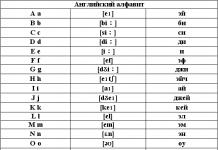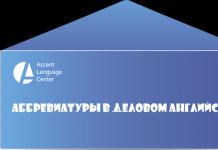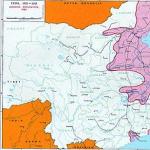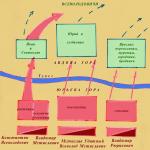Transcription is a recording of the sound of a letter or word in the form of a sequence of special phonetic symbols.
Transcription may not be of interest to everyone, but it is, without a doubt, useful. Knowing the transcription, you will correctly read an unfamiliar word without outside help. During classes, you can read the transcription of a word yourself (for example, from the blackboard) without asking others, thereby making it easier for yourself to assimilate lexical material, etc.
At first there will be errors in correct reading, because... There are always some subtleties in pronunciation. But this is just a matter of practice. A little later, if necessary, you will be able to transcribe the words yourself.
Transcription is directly related to reading rules. In English, not everything that is seen (letter combinations) is read (as in Russian and Spanish, for example).
When textbooks (mostly domestic ones) talk about reading rules, much attention is paid to the type of syllable. About five such types are usually described. But such a detailed theoretical presentation of the rules of reading does not greatly ease the fate of a beginner, and can even mislead him. It must be remembered that a good knowledge of the rules of reading is a great merit of practice, not theory.
Your attention will be presented to the basic rules for reading individual letters and letter combinations. “Behind the scenes” there will be some phonetic aspects that are difficult to convey in writing.
A little patience! Both transcription and reading rules are easily learned in a short time. Then you will be surprised: “How easy it has become to read and write!”
However, do not forget that, despite its wide distribution, the English language does not cease to be a LANGUAGE, full of exceptions, stylistic and other delights. And at any stage of language learning, and especially at the beginning, look into the dictionary more often.
You can download the tables. They are listed below on the page. We use it and remember it.
Table 1 - Letters, sounds, names and pronunciations of letters.
| Letter | Sounds
(for vowels: 1) open 2) closed) |
(Approximate)
Name letters |
(Approximate)
pronunciation sounds |
Example words |
| A a | , [æ] | "Hey" | "hey", "uh" open | n a me, m a n [æ] |
| Bb | [b] | "bi:" | "b" | |
| C c | [k], [s] before i, e, y | "si:" | "k", "s" | c at [k], ni c e [s] |
| D d | [d] | "di:" | "d" | |
| E e | ,[e] | "And:" | "and:", "e" | h e , p e n[e] |
| F f | [f] | "ef" | "f" | |
| G g |
[g], [ʤ] before i, e, y |
"ji:" | "g", "j" | g ame [g], g ym[ʤ] |
| H h | [h] | "H" | "X" | |
| I i | , [ɪ] | "ouch" | "ay", "and" | l i ke, b i g[ɪ] |
| Jj | [ʤ] | "jay" | "j" | |
| K k | [k] | "kay" | "To" | |
| Ll | [l] | "el" | "l" | |
| Mm | [m] | "Em" | "m" | |
| Nn | [n] | "en" | "n" | |
| O o | [әu], [ɒ(ɔ)] | "OU" | "oh", "oh" | g o [әu], d o g[ɒ] |
| P p | [p] | "pi:" | "P" | |
| Q q | "Q" | "kv" | ||
| R r | [r] | "A" | "R" | |
| Ss | [s], [z] | "es" | "s", "z" | |
| T t | [t] | "ty:" | "T" | |
| U u | , [u], [ʌ] | "Yu" | "yu", "u", "a" | p u
pil, p u
t[u], c u p[ʌ] |
| V v | [v] | "in and:" | "V" | |
| W w | [w] | "double u" | [w] sound between “u” and “v”» | |
| X x | , | "the ex" | "ks", "gz" | fox, exam |
| Y y | , [ɪ] - at the end of a word [j] - at the beginning of a word |
"wy" | "ay", "i", "th" | m y
,bab y
[ɪ],
y es[j] |
| Z z | [z] | "zed" | "z" |
|
Letter combination |
Sounds | (Approximate) pronunciation sounds |
Example words |
| ar/al | "a:" | car, park, calm | |
| all | [ↄ:] | "O:" | tall, ball |
| ee/ea | "And:" | see, tea | |
| er / or (at the end of a word) | [ә] | "e" is weak | doctor, better |
| oo | [u], | "y", "y:" | book, school |
| oy / oi | [ↄɪ] | "Ouch" | boy, boil |
| ow/ou | "ay" | how, mouse | |
| or /our /oar /oor | [ↄ:] | "O:" | horse, four, board, door |
| ir/ur/er | [ɜ:] (ә:) | "e" | bird, turn, berth |
| ere/ear | [ɪә] | "ee" | here, hear |
| air/ear/ere | (ɛә) | "ea" | hair, wear, where |
| sh | [ʃ] | "sh" | ship, shop |
| tion / cion / sion (at the end of a word) | [ʃn] | "shn" | situation, suspicion, admission |
| ch | [ ʧ] | "h" | cheese, cheap |
| ph | [f] | "f" | phone, physics |
| th | [ð], [Ѳ] | this, thanks | |
| dg | [ʤ] | "j" | judge |
| zh | [ʒ] | "and" | Voronezh |
| sure (at the end of a word) | [ʒ] | "and" | treasure, measure |
| ng | [ŋ] | "n" nasal | sing, song |
Learn more about what the prime, colon, parentheses, and other symbols mean.
You can look at another version of the English transcription and, if necessary, print or copy it for editing in Microsoft Word
English Transcription
Pronunciation of English sounds.
Pronunciation of English vowels.
The pronunciation of English sounds is presented in Russian letters; you should understand that it is not possible to convey the correct English pronunciation using the Russian alphabet.
- ɑː long, deep
- ʌ short vowel a, as in the Russian word run.
- ɒ = ɔ - short, open about
- ɔː - long o
- zː - long vowel e, as in the Russian word hedgehog.
- æ - open e
- e - like e in the word these
- ə - unclear unstressed sound, similar to e
- iː - long and
- ɪ - short, open and
- ʊ = u - short u, pronounced with a slight rounding of the lips.
- uː - long u pronounced without strong rounding of the lips.
Two-vowel sounds
Pronunciation of English consonants.
- p - p
- b - b
- m - m
- f - f
- v - in
- s - s
- z - z
- t - resembles the Russian sound t, pronounced with the tongue positioned at the gums.
- d - resembles the Russian sound d, pronounced with the tongue positioned at the gums.
- n - resembles the Russian sound n, pronounced with the tongue positioned at the gums.
- l - resembles the Russian sound l, pronounced with the tongue positioned at the gums.
- r is a very hard sound pronounced without vibration of the tongue. Corresponds to the sound r in the word lot
- ʃ - soft Russian sh
- ʒ - soft Russian zh, as in the word yeast.
- tʃ- h
- ʤ - similar to the Russian sound j (voiced ch)
- k - k
- h - inhale, reminiscent of a faintly pronounced x sound
- ju - long yu in the word southern
- je - sound e in the word spruce
- jɔ - sound ё in the word fir-tree
- jʌ - the sound I in the word pit
- j - resembles the Russian sound й before vowels. Occurs in combination with vowels.
English consonant sounds that have no approximate correspondence in Russianː
- w - formed with the help of rounded lips (as in whistling). It looks like a sound uttered with just lips. In translation it is denoted by the letters в or у ː W illiams - Williams, Williams.
- ƞ - Open your mouth slightly and say n without closing your mouth.
- ɵ - Move the slightly spread tip of your tongue between your teeth and pronounce Russian with
- ð - Move the slightly spread tip of your tongue between your teeth and pronounce Russian z
Sounds of English- this is a difficult and quite voluminous topic that will require perseverance and patience from you. In order for you to master this level more easily and quickly, I suggest you work with English sounds in the table. If you remember, there are 44 sounds in the British pronunciation system, and it is with them that we will work. The peculiarities of American pronunciation can be found in a separate article. For convenience, the table is divided into separate theoretical blocks, which tell you how to correctly pronounce a particular sound.
Before starting work, be sure to read the following information:
British English has 44 sounds:
24 consonants:
- paired, voiced and unvoiced:
/b/-/p/, /z/-/s/, /d/-/t/, /v/-/f/, /dʒ/-/tʃ/, /ʒ/-/ʃ/, /ð /-/θ/, /g/-/k/ - unpaired, voiced and voiceless:
/l/, /m/, /n/, /j/, /r/, /w/, /h/, /ŋ/
With consonant sounds, everything is more or less clear: paired - unpaired, voiced - voiceless. We know about these categories from the school course on phonetics of the Russian language. We also know that in Russian consonants can be soft and hard. In English there is no concept of softness and hardness of consonant sounds. There is the concept of palatalization - softening consonants in position before some vowels, by raising the back of the tongue to the hard palate. What exactly is the difference? The thing is that in Russian the softness and hardness of consonant sounds affects the semantic meaning of the word. Compare: “empty” - “let”, “out” - “stench”, “weight” - “all”. In English, softening consonant sounds does not affect the meaning of words, but is only the result of a mechanical change in sound in the flow of speech.
20 vowels:
- closed, long and short:
/iː/, /ɪ/, /uː/, /ʊ/ - medium-open, long and short:
/e/, /ɜː/, /ə/, /ɔː/ - open, long and short:
/æ/, /ʌ/, /ɑː/, /ɒ/ - diphthongs:
/eɪ/, /aɪ/, /ɔɪ/, /aʊ/, /əʊ/, /ɪə/, /eə/, /ʊə/
With vowels it’s a little more complicated: closed, open, mid-open. What is it about? About the position of the tongue in the oral cavity. When pronouncing open vowels, the tongue lies low in the mouth and does not touch the palate. Pronounce the Russian sound /a/, which is open, and notice that the tongue lies low in the mouth. When pronouncing closed vowels, the tongue is very close to the palate. Pronounce the Russian sound /и/, which is closed, and notice that the tongue curves the back, like a kitten, and the back almost touches the hard palate. When pronouncing mid-open ones, the tongue takes an intermediate position. Pronounce the Russian sound /e/, which is mid-open and remember the position of the tongue. Long and short vowels. What is it about? About the duration of sound pronunciation. Long sounds last longer than short ones. The longitude of a sound in English transcription is indicated as a colon sign, followed by the sound sign /iː/, /ɜː/, /ɑː/, /ɔː/. Diphthongs. What is this? This is a sound consisting of two vowel sounds, the first element of the diphthong sounds stressed, and the second weak. Well, now you can start working on English sounds in the table.
| /æ/ | We open our mouth in order to pronounce the Russian sound /a/, but at the same time we pronounce the sound /e/. To avoid mistakes like the Russian sound /e/, you should open your mouth wider, the tip of the tongue remaining at the lower teeth. In case of an error such as the Russian sound /a/, you should press the tip of your tongue to your lower teeth and open your mouth wider. (open, short) |
| /ɪ/ | We open our mouth in order to pronounce the Russian sound /и/, but at the same time we try to pronounce the sound /ы/. To avoid mistakes like the Russian sound /и/, you should not raise your tongue too high, you need to pull it back slightly and shorten the sound. If you make an error like Russian /ы/, you should move your tongue forward, stretch your lips and shorten the sound as much as possible. (closed, short) |
| /e/ | We pronounce the Russian words “chalk”, “warmed”, “stump”, “cedar”. We remember how the letter “e” sounds when pronounced in these words and use it as the sound /e/ in English. If you make an error like Russian /e/, you should open your mouth less, stretch your lips slightly and move your tongue forward. (medium open, short) |
| /ɒ/ | We pronounce the Russian sound /o/, but do not extend our lips forward. In case of an error like Russian /o/, you should open your mouth wider, lower and move your tongue lower, rounding your lips, do not pull them forward and slightly shorten the sound. (open, short) |
| /ʊ/ | We pronounce the Russian sound /у/, but at the same time we arch the back of our tongue, almost touching the hard palate with it and do not stretch our lips forward. The lips are slightly rounded. In case of an error such as the Russian vowel /у/, which is an open sound, we monitor the position of the tongue, ensuring that the sound is closed and do not stretch the lips forward. (closed, short) |
| /b/ |
They practically correspond to the Russian sound /b/, but when pronounced at the end of a word, unlike the Russian sound, it is practically not deafened. Compare "oak" - /dup/ and "Bob" - /bob/. |
| /p/ |
It is similar to the Russian sound /p/, but is pronounced more dull. The dull sound is produced by aspiration. That is, the opening of the lips seems to be exhaled, and does not occur with an explosion. The sound is a bit like /pf/ or /ph/. In addition, at the end of words, English /p/ sounds strong, and does not weaken like Russian /p/. |
| /g/ |
It is similar to the Russian sound /g/, but sounds less sonorous at the beginning of words and is practically not deafened at the end of words. |
| /k/ |
It is similar to the Russian sound /k/, but sounds more energetic and is pronounced with aspiration. The sound is a bit like /kf/ or /kh/. |
| /d/ | We pronounce the Russian sound /d/, but at the same time we do not touch the upper teeth with the tip of the tongue, but place it on the alveoli (tubercles on the hard palate, behind the upper teeth). Unlike the Russian consonant /d/, the English /d/ at the end of words is partially deafened. |
| /t/ | We pronounce the Russian sound /t/, but at the same time we do not touch the upper teeth with the tip of the tongue, but place it on the alveoli (tubercles on the hard palate, behind the upper teeth). The English voiceless consonant /t/ is stronger than the Russian /t/ and is pronounced aspirated. The resulting sound is a bit like /tf/ or /th/. |
| /n/ | We pronounce the Russian sound /n/, but at the same time we do not touch the upper teeth with the tip of the tongue, but place it on the alveoli (tubercles on the hard palate, behind the upper teeth). |
| /h/ | It resembles the Russian sound /х/, but is not pronounced energetically with an explosion, but is only a light exhalation. Occurs only before vowels. If you make an error like Russian /х/, you should weaken the consonant until you exhale lightly. |
big, ben, book, bog, ban - /bɪɡ/, /ben/, /bʊk/, /bɒɡ/, /bæn/
dig, den, hood, dog, bad - /dɪɡ/, /den/, /hʊd/, /dɒɡ/, /bæd/
tip, ten, took, top, tap - /ˈtɪp/, /ten/, /tʊk/, /tɒp/, /tæp/
get, gig, good, god, gap - /ˈɡet/, /ɡɪɡ/, /ɡʊd/, /ɡɒd/, /ɡæp/
kit, Ken, cook, cod, cap - /kɪt/, /ken/, /kʊk/, /kɒd/, /kæp/
Nick, net, nook, not, Nat - /nɪk/, /net/, /nʊk/, /nɒt/, /næt/
hit, hen, hook, hot, ham - /hɪt/, /hen/, /hʊk/, /hɒt/, /hæm/
Don't try to work through everything at once. Yes, you won’t be able to do this, since the amount of work with sounds is designed for several astronomical hours, at a minimum. Work through the theory in blocks, be sure to complete the exercises at the end of the block. The main thing in learning a language is regularity. It is better to work 15-20 minutes every day than 2-3 hours once a week.
Pay attention to the pronunciation of long vowel sounds and the pronunciation of consonant sounds, which have no analogues in the Russian language.
| /ɑː/ | We pronounce the Russian sound /a/, but at the same time we pull the tip of the tongue away from the lower teeth as far back as possible, without straining our lips. If you make an error like Russian /a/, you should pull your tongue back and lengthen the vowel somewhat and not open your mouth too wide. (open, long) |
| /ɔː/ |
We pronounce the Russian sound /o/, but at the same time we pull the tip of the tongue away from the lower teeth as far back as possible, without straining our lips or pulling them forward. If you make an error like Russian /o/, you should strive for a more open pronunciation and do not pull your lips forward. Compared to English /ɑː/, the /ɔː/ sound is less open. (open, long) |
| /uː/ | We pronounce the Russian sound /у/, but at the same time we do not stretch our lips forward, we round our lips, but do not tense them. In the process of pronouncing the sound /u:/, we pull the tip of the tongue away from the lower teeth as far back as possible. In case of an error like Russian /у/, you should first of all ensure that the lips are rounded, but not pulled forward. (closed, long) |
| /l/ |
We pronounce the Russian sound /l/, but at the same time we place the tip of the tongue on the alveoli (tubercles on the hard palate). The English sound /l/ has two sounds:
|
| /m/ | We pronounce the Russian sound /m/, but at the same time we tense our lips more. |
| /r/ | We are preparing to pronounce the Russian sound /zh/, but at the same time we are trying to pronounce the Russian sound /r/. To pronounce the sound correctly, we make sure that the tip of the tongue is behind the alveoli (tubercles on the hard palate), but does not touch them, remains tense and motionless. |
| /w/ | There is no similar sound in the Russian language. Vaguely similar to the Russian sound /ua/. To correctly pronounce this sound, we stretch our lips forward as for pronouncing the Russian sound /у/, while the lips are tense and rounded, in this position we try to quickly pronounce the Russian sound /v/. In case of an error like Russian /v/, make sure that the lower lip does not come into contact with the upper teeth and upper lip. In case of an error like Russian /ы/, we strain and round our lips even more. |
| /ŋ/ | There is no similar sound in the Russian language. To pronounce this sound correctly, we press the back of the tongue against the soft palate and try to pronounce the Russian sound /n/. In case of an error like Russian /n/, open your mouth wider and make sure that the tip of the tongue does not touch the upper teeth or alveoli, but is located at the roots of the lower teeth. |
| /v/ | Almost corresponds to the Russian sound /v/. English /v/ sounds weaker than Russian /v/, but at the end of words it is practically not deafened. |
| /f/ | Almost corresponds to the English sound /f/. English /f/ sounds stronger than Russian /f/, especially at the end of words |
| /z/ | Almost corresponds to the Russian sound /z/. But it sounds weaker. At the end of words there is almost no deafening. |
| /s/ | Almost corresponds to the Russian sound /s/. But it sounds much more energetic. |
| /ð/ | There is no similar sound in the Russian language. In order to pronounce this sound correctly, we place the tip of the tongue between the upper and lower front teeth and try to pronounce the Russian sound /z/. At the end of words, this English voiced consonant is almost unvoiced. In case of an error like Russian /з/, we make sure that the tip of the tongue does not hide behind the teeth. In case of an error like Russian /d/, make sure that the tongue is not pressed against the upper teeth; there should be a small gap between the tip of the tongue and the upper teeth. In case of an error like Russian /v/, make sure that the lower lip is lowered. |
| /θ/ | There is no similar sound in the Russian language. In order to pronounce this sound correctly, we place the tip of the tongue between the upper and lower front teeth and try to pronounce the Russian sound /s/. In case of an error like Russian /s/, make sure that the tip of the tongue does not hide behind the teeth. In case of an error like Russian /t/, make sure that the tongue is not pressed against the upper teeth; there should be a small gap between the tip of the tongue and the upper teeth. In case of an error like Russian /f/, make sure that the lower lip is lowered. |
lark, look, lips, last - /lɑːk/, /lʊk/, /lɪps/, /lɑːst/
mood, moon, mask, mast - /muːd/, /muːn/, /mɑːsk/, /mɑːst/
rude, red, rock, room - /ruːd/, /red/, /rɒk/, /ruːm/
what, when, well, wool - /ˈwɒt/, /wen/, /wel/, /wʊl/
sing, sink, wink, pink - /sɪŋ/, /sɪŋk/, /wɪŋk/, /pɪŋk/
zip, zink, zing, zoo - /zɪp/, /ˈzɪŋk/, /zɪŋ/, /zuː/
silky, swim, sick, soon - /ˈsɪlki/, /swɪm/, /sɪk/, /suːn/
vase, voodoo, vest, vast - /vɑːz/, /ˈvuː.duː/, /vest/, /vɑːst/
farm, fool, food, fast - /fɑːm/, /fuːl/, /fuːd/, /fɑːst/
thin, think, threat, theft - /θɪn/, /ˈθɪŋk/, /θret/, /θeft/
this, the, then, them - /ðɪs/, /ði:/, /ðen/, /ðəm/
four, store, fork, door - /fɔː/, /stɔː/, /fɔːk/, /dɔː/
If you are reading these lines, it means you have worked through the first two blocks and you have successfully mastered as much as 50% of this difficult topic. Please accept my congratulations and let me praise you for your diligence, hard work and patience! After all, these are precisely the qualities that will lead you to triumph on the path of mastering the English language. Starting work on the third block English sounds in the table, do not forget that “repetition is the mother of learning.” Therefore, be sure to return to the completed blocks and do not be lazy to repeat them!
Pay attention to the pronunciation of the neutral sound /ə/, long vowels, and diphthongs.
| /ə/ | There is no similar sound in the Russian language. We pronounce the Russian words “mint”, “guys”, “Volodya”, the sound of the letter “ya” in these words vaguely resembles the English sound /ə/, only it sounds unstressed, weak, unclear, almost imperceptible. In case of an error such as the Russian unstressed /a/ as in the word “summer” - /l"`et A/, raise the entire tongue to the hard palate. (medium open, short) |
| /ɜː/ | There is no similar sound in the Russian language. We pronounce the Russian words “plait”, “bloom”, “chalk”, the sound of the letter “е” in these words vaguely resembles the English sound /з:/. When pronouncing this sound, we make sure that the tip of the tongue is at the lower teeth, the distance between the upper and lower teeth is kept small, we do not stretch our lips, we achieve their neutral position. (medium open, long) |
| /iː/ | It vaguely resembles the Russian sound of “ii” in the words “strong”, “marked”, “rare”. Two-level sound, i.e. sounds heterogeneous in the initial and final positions. In the initial position, the tongue is in the front of the mouth, the tip of the tongue touches the lower teeth, the middle part of the tongue is raised high to the hard palate, the lips are somewhat stretched. During the pronunciation process, the tongue moves from a lower and pushed back position to a higher and forward position. (closed, long) |
| /eɪ/ | It’s a bit reminiscent of the Russian sound of “hey” in the words “bolder”, “more cheerful”, “warm up”. The core of the diphthong is the mid-open, short vowel sound /e/. After pronouncing the nucleus, the tongue makes a slight upward movement in the direction of the sound /ɪ/, without, however, achieving its complete formation. Pronunciation of a sound like Russian /th/ should not be allowed. (diphthong) |
| /aʊ/ | A bit reminiscent of the Russian sound of “ay” in the words “round”, “bounty”. In case of an error like Russian /ay/ we make sure that the second element sounds unstressed and weakened. (diphthong) |
| /eə/ | The core of the diphthong is the English mid-open short vowel /e/, the second element is the unstressed English vowel /ə/. (diphthong) |
| /ʒ/ | We pronounce the Russian sound /zh/ but at the same time soften its sound. |
| /ʃ/ | We pronounce the Russian sound /sh/ but at the same time soften its sound. |
| /j/ | It is similar to the Russian sound /й/, but has a weaker pronunciation. |
should, shake, shame, shirt - /ʃʊd/, /ʃeɪk/, /ʃeɪm/, /ʃɜːt/
yes, yet, you, your - /jes/, /jet/, /ju/, /jə/
world, work, heard, word, bird - /wɜːld/, /ˈwɜːk/, /hɜːd/, /ˈwɜːd/, /bɜːd/
never, ever, fever, river - /ˈnevə/, /ˈevə/, /ˈfiːvə/, /ˈr.və/
sea, eat, beef, these, beans - /siː/, /iːt/, /biːf/, /ðiːz/, /biːnz/
stay, hey, play, hate, game - /steɪ/, /heɪ/, /ˈpleɪ/, /heɪt/, /ɡeɪm/
how, now, about, round, ground - /ˈhaʊ/, /naʊ/, /əˈbaʊt/, /ˈraʊnd/, /ɡraʊnd/
wear, hair, player, repair, theirs - /weə/, /heə/, /ˈpleɪə/, /rɪˈpeə/, /ðeəz/
Hooray! You have to master the last block English sounds in the table. This means that very soon you will begin to easily read the transcription of English words in the dictionary and begin working with them independently in our word library, which was created so that you develop and expand your vocabulary.
Pay attention to the pronunciation of the short sound /ʌ/, diphthongs, consonants, which have no analogues in the Russian language.
| /dʒ/ | There is no similar sound in the Russian language. A bit reminiscent of the Russian sound "dzh". In order to avoid mistakes like the Russian “j”, we make sure that both components sound together and not separately as in the words “jam”, “jazz”. Prepare to pronounce the Russian sound /ch/, but at the same time pronounce “dzh”. |
| /tʃ/ | It resembles the Russian sound /ch/, but sounds harder. |
| /ʌ/ | Pronounce the Russian sound /a/, but at the same time pull your tongue back, keep your mouth half open and your lips neutral. In case of an error like Russian /a/, the language should be reversed. English /ʌ/ sounds shorter than Russian /a/. (open, short) |
| /aɪ/ | A bit reminiscent of the Russian sound of “ai” in the words “paradise” and “boycott”. In case of an error like Russian /ai/, we make sure that the second element sounds unstressed and weakened. (diphthong) |
| /ɔɪ/ | A bit reminiscent of the Russian sound of “oy” in the words “fight”, “hero”. The nucleus of a diphthong is something between a long /ɔː/ and short /ɒ/. In case of an error like /oy/, the first element of the diphthong should be made more open, and the second element weakened. (diphthong) |
| /əʊ/ | There is no similar sound in the Russian language. The diphthong core is close in sound to English /з:/. After pronouncing the nucleus, the tongue makes a slight upward movement and moves back in the direction of articulation [ʊ]. In case of an error like Russian /оу/, we do not extend our lips forward. In case of an error like Russian /eu/, we do not stretch our lips, we round them. (diphthong) |
| /ɪə/ | There is no similar sound in the Russian language. The core of the diphthong is the short vowel /ɪ/. After pronouncing the nucleus, the tongue moves towards the center in the direction of /ə/. To avoid mistakes like Russian /ia/, we make sure that the second element of the diphthong sounds weakened. (diphthong) |
| /ʊə/ | There is no similar sound in the Russian language. The core of the diphthong is the short vowel /ʊ/. After pronouncing the nucleus, the tongue moves towards the center in the direction of /ə/. To avoid mistakes like Russian /ua/, we do not round or protrude our lips forward, and make sure that the second element of the diphthong sounds weakened. (diphthong) |
jug, jog, gem, general, jeep - /dʒʌɡ/, /dʒɒɡ/, /dʒem/, /ˈdʒenrəl/, /dʒiːp/
chest, chair, chain, choose, cheap - /tʃest/, /tʃeə/, /tʃeɪn/, /tʃuːz/, /tʃiːp/
why, tie, buy, fly - /waɪ/, /taɪ/, /baɪ/, /flaɪ/
boy, toy, joy, voice, employ - /ˌbɔɪ/, /tɔɪ/, /dʒɔɪ/, /vɔɪs/, /ɪmˈplo.ɪ/
near, dear, beer, here, gear - /nɪə/, /dɪə/, /bɪə/, /hɪə/, /ɡɪə/
pure, sure, tour, cure, lure - /pjʊə/, /ʃʊə/, /tʊə/, /kjʊə/, /lʊə/
cup, nut, mug, sun, bud - /kʌp/, /nʌt/, /mʌɡ/, /sʌn/, /bʌd/
Congratulations on your successful completion English sounds in the table! Now you can move on to mastering the second stage in learning English phonetics. Namely, learn the rules of word stress, the rules of copula and reduction of sounds, which will be discussed in our next article
There are 26 letters in the English language. In different combinations and positions they represent 44 sounds.
In the English language, there are 24 consonant sounds, and they are represented in writing by 20 letters: Bb; Cc; Dd; Ff; Gg ; Hh; Jj; Kk; LI; mm; Nn; Pp; Qq; Rr; Ss; Tt; Vv; Ww; Xx; Zz.
In the English language, there are 12 vowel sounds and 8 diphthongs, and they are represented in writing by 6 letters: Aa; Ee; li; Oo; Uu; Yy. 
Video:
[English language. Beginner course. Maria Rarenko. First educational channel.]
Transcription and stress
Phonetic transcription is an international system of symbols used to show exactly how words should be pronounced. Each sound is shown with a separate icon. These icons are always written in square brackets.
The transcription indicates verbal stress (which syllable in the word the stress falls on). Accent mark [‘]
placed before the stressed syllable.
English consonants
- Features of English consonants
- English consonants expressed by letters b, f, g, m, s, v, z, are close in pronunciation to the corresponding Russian consonants, but should sound more energetic and intense.
- English consonants are not softened.
- Voiced consonants are never deafened - neither before voiceless consonants, nor at the end of a word.
- Double consonants, that is, two identical consonants next to each other, are always pronounced as one sound.
- Some English consonants are pronounced aspirated: the tip of the tongue must be pressed firmly against the alveoli (the tubercles where the teeth are attached to the gums). Then the air between the tongue and teeth will pass with force, and the result will be a noise (explosion), that is, aspiration.
Rules for reading consonant letters in English: ,
| Table of pronunciation of English consonants | ||
|---|---|---|
| Phonetic transcription | Examples | |
| [b] | b ad b ox | voiced sound corresponding to Russian [b] in the word b rat |
| [p] | o p en, p et | a dull sound corresponding to the Russian [p] in the word P ero, but pronounced aspirated |
| [d] | d i d, d ay | a voiced sound similar to Russian [d] in the word d ohm, but more energetic, “sharper”; when pronouncing it, the tip of the tongue rests on the alveoli |
| [t] | t ea, t ake | unvoiced sound corresponding to Russian [t] in the word T hermos, but is pronounced aspirated, with the tip of the tongue resting on the alveoli |
| [v] | v oice, v isit | voiced sound corresponding to Russian [v] in the word V osk, but more energetic |
| [f] | f ind, f ine | a dull sound corresponding to the Russian [f] in the word f inik, but more energetic |
| [z] | z oo, ha s | voiced sound corresponding to Russian [z] in the word h ima |
| [s] | s un, s ee | a dull sound corresponding to the Russian [s] in the word With silt, but more energetic; when pronouncing, the tip of the tongue is raised towards the alveoli |
| [g] | g ive, g o | voiced sound corresponding to Russian [g] in the word G Irya, but pronounced softer |
| [k] | c at, c an | a dull sound corresponding to the Russian [k] in the word To mouth, but pronounced more energetically and aspiratedly |
| [ʒ] | vi si on, plea sur e | voiced sound corresponding to Russian [zh] in the word and macaw, but pronounced more tense and softer |
| [ʃ] | sh e, Ru ss ia | a dull sound corresponding to the Russian [ш] in the word w ina, but pronounced softer, for which you need to raise the middle part of the back of the tongue to the hard palate |
| [j] | y ellow, y ou | a sound similar to the Russian sound [th] in a word th od, but pronounced more energetically and intensely |
| [l] | l itt l e, l ike | sound similar to Russian [l] in the word l Isa, but you need the tip of the tongue to touch the alveoli |
| [m] | m an m erry | sound similar to Russian [m] in the word m ir, but more energetic; when pronouncing it, you need to close your lips more tightly |
| [n] | n o, n ame | sound similar to Russian [n] in the word n OS, but when pronouncing it, the tip of the tongue touches the alveoli, and the soft palate is lowered, and air passes through the nose |
| [ŋ] | si ng,fi ng er | a sound in which the soft palate is lowered and touches the back of the tongue, and air passes through the nose. Pronounced like Russian [ng] is incorrect; there must be a nasal sound |
| [r] | r ed, r abbit | a sound, when pronounced with the raised tip of the tongue, you need to touch the middle part of the palate, above the alveoli; tongue doesn't vibrate |
| [h] | h elp, h ow | sound reminiscent of Russian [х] as in the word X aos, but almost silent (barely audible exhalation), for which it is important not to press the tongue to the palate |
| [w] | w et, w inter | a sound similar to a very quickly pronounced Russian [ue] in a word Ue ls; in this case, the lips need to be rounded and pushed forward, and then vigorously moved apart |
| j ust, j ump | sound similar to [j] in a Russian loanword j inces, but more energetic and softer. You cannot pronounce [d] and [ʒ] separately | |
| ch eck, mu ch | sound similar to Russian [ch] in a word h ac, but harder and more intense. You cannot pronounce [t] and [ʃ] separately | |
| [ð] | th is, th ey | a ringing sound, when pronounced, the tip of the tongue must be placed between the upper and lower teeth and then quickly removed. Do not clamp the flat tongue between your teeth, but slightly push it into the gap between them. This sound (since it is voiced) is pronounced with the participation of the vocal cords. Similar to Russian [z] interdental |
| [θ] | th ink, seven th | a dull sound that is pronounced in the same way as [ð], but without a voice. Similar to Russian [s] interdental |
English vowel sounds
- The reading of each vowel depends on:
- from other letters standing next to it, in front of it or behind it;
- from being in a shock or non-stress position.
Rules for reading vowels in English: ,
| Pronunciation table for simple English vowel sounds | ||
|---|---|---|
| Phonetic transcription | Examples | Approximate matches in Russian |
| [æ] | c a t,bl a ck | a short sound, intermediate between the Russian sounds [a] and [e]. To make this sound, when pronouncing Russian [a], you need to open your mouth wide and place your tongue low. Simply pronouncing Russian [e] is wrong |
| [ɑ:] | ar m, f a ther | a long sound, similar to Russian [a], but it is much longer and deeper. When pronouncing it, you need to yawn, but do not open your mouth wide, while pulling your tongue back |
| [ʌ] | c u p, r u n | a short sound similar to the Russian unstressed [a] in the word With A yes. To make this sound, when pronouncing Russian [a], you need to almost not open your mouth, while slightly stretching your lips and moving your tongue back a little. Simply pronouncing Russian [a] is wrong |
| [ɒ] | n o t, h o t | short sound similar to Russian [o] in the word d O m, but when pronouncing it you need to completely relax your lips; for Russian [o] they are slightly tense |
| [ɔ:] | sp o rt, f ou r | a long sound, similar to Russian [o], but it is much longer and deeper. When pronouncing it, you need to yawn, as if with your mouth half-open, and your lips tense and rounded |
| [ə] | a bout, a lias | a sound that is often found in the Russian language is always in an unstressed position. In English, this sound is also always unstressed. It does not have a clear sound and is referred to as an unclear sound (it cannot be replaced by any clear sound) |
| [e] | m e t,b e d | a short sound similar to Russian [e] under stress in words such as uh you, pl e d etc. English consonants before this sound cannot be softened |
| [ɜː] | w or k, l ear n | this sound does not exist in the Russian language, and it is very difficult to pronounce. Reminds me of Russian sound in words m e d, St. e cla, but you need to pull it out much longer and at the same time stretch your lips strongly without opening your mouth (you get a skeptical smile) |
| [ɪ] | i t, p i t | a short sound similar to the Russian vowel in a word w And t. You need to pronounce it abruptly |
| h e, s ee | a long sound, similar to Russian [i] under stress, but longer, and they pronounce it as if with a smile, stretching their lips. There is a Russian sound close to it in the word poem II | |
| [ʊ] | l oo k, p u t | a short sound that can be compared with the Russian unstressed [u], but it is pronounced energetically and with completely relaxed lips (lips cannot be pulled forward) |
| bl u e, f oo d | a long sound, quite similar to the Russian percussion [u], but still not the same. To make it work, when pronouncing Russian [u], you need not to stretch your lips into a tube, not to push them forward, but to round them and smile slightly. Like other long English vowels, it needs to be drawn out much longer than Russian [u] | |
| Diphthong pronunciation table | ||
|---|---|---|
| Phonetic transcription | Examples | Approximate matches in Russian |
| f i ve, ey e | diphthong, similar to the combination of sounds in Russian words ah And h ah | |
| [ɔɪ] | n oi se, v oi ce | somehow. The second element, the sound [ɪ], is very short |
| br a ve, afr ai d | a diphthong similar to a combination of sounds in a Russian word w to her ka. The second element, the sound [ɪ], is very short | |
| t ow n, n ow | a diphthong similar to a combination of sounds in a Russian word With aw on. The first element is the same as in ; the second element, the sound [ʊ], is very short | |
| [əʊ] | h o me, kn ow | a diphthong similar to a combination of sounds in a Russian word cl OU n, if you do not pronounce it deliberately syllable by syllable (in this case, the consonance resembles ew ). Pronouncing this diphthong as a pure Russian consonance [ou] is wrong |
| [ɪə] | d ea r, h e re | a diphthong, similar to the combination of sounds in the Russian word such; consists of short sounds [ɪ] and [ə] |
| wh e re,th e re | a diphthong, similar to the combination of sounds in the Russian word dlinnosheye, if you do not pronounce it syllable by syllable. Behind the sound resembling Russian [e] in the word uh That, followed by the second element, an unclear short sound [ə] | |
| [ʊə] | t ou r, p oo r | a diphthong in which [ʊ] is followed by a second element, an unclear short sound [ə]. When pronouncing [ʊ], lips should not be pulled forward |
People mainly learn English to communicate with foreigners in a given situation. However, if your pronunciation is low and you often confuse accents, then no communication will work.
At the same time, many people are sure that there is no need to learn the rules of pronunciation in English, since it is a waste of time. But even a wide vocabulary and extensive knowledge of grammar will not be enough for you to fully communicate.
Let's talk about the pronunciation of English words. Yes it is hard. It is sometimes very difficult to copy their speech. Oh, I really want to say something like that right away, in English, but no, not so quickly. Our language is not as soft, not as varied in sound effects as English. It contains more than 50 sounds. And what to do with them? How to remember? But everything is not as scary as it seems. After all, all sounds are formed with the help of our mouth, which means it’s real. I have often seen how those beginning to study a language, finding literature in which the pronunciation of all English words is given in Russian letters, became wildly delighted. Yes, I don’t argue, this makes the work easier at first, and this technique has a right to exist. And since my site, after all, is designed for such people, you will find all the new words not in transcription, but written in Russian letters, and this will make your life easier at first. Although I am not a supporter of this method, I do it, one might say, at the request of the workers.
But what will you do when you come across an unfamiliar, never-before-seen word? You will, of course, use a dictionary. And in the dictionary... Fathers! But this is not something a mere mortal can read. In addition to English letters, there are some other icons nearby. In short, read this nonsense for yourself. But take your time. These icons, as you know, are called transcription. If you know it, it makes reading the word a lot easier. Even in Russian there is such a transcription, because After all, even in our native language, the spelling and pronunciation of words are far from the same. That's why we learn a lot of rules in order to be literate. And in English you simply need to understand these signs, otherwise you will not be able to pronounce a single word correctly. I advise you to arm yourself with an English-Russian dictionary and compare words with transcriptions as needed. It is necessary to gradually develop the skill of reading through transcription. And you will soon appreciate this knowledge and begin to read and pronounce words correctly.
Theoretical phonetics of English
Theoretical phonetics of the English language absorbs generalized information about parts of the phonetic structure of an English word. It explains the interaction between acoustic and written forms of speech. Phonetics pays attention not only to sound aspects, but also to the human articulatory apparatus.
When studying the theoretical phonetics of the English language, a person encounters the following topics:
1. Phonemes of the English language. Distinctive features of phonemes.
2. Cardinal type vowels.
3. Articulation abilities of sounds.
4. Correct interpretation of the phoneme.
5. Methods of conducting phonetic analysis of a word.
6. Phonological schools.
7. System of vowel sounds.
8. System of consonants.
9. What are alloforms?
Quite a long time is devoted to the method of carrying out phonetic analysis of words. Using analysis, sounds are broken down into consonants and vowels, and their classification is made. Special attention
Phonetic features of the English language in examples
The first thing you need to master in phonetics is transcription. English is a rather unusual language, in which there are a lot of rules for the pronunciation of words and letter combinations. And the first step in learning this is transcription.
The English alphabet is based on the Latin alphabet, while the Russian alphabet is based on the Cyrillic alphabet. Hence all the difficulties: in English there are practically no sounds that would be similar to Russian ones. For example, in English there are often diphthongs (two vowels in one syllable): source, joy, team.
SkypeTeach
Cost of education: From 390 rubles/lesson
Discounts: -
Training mode: Via Skype
Free lesson: Eat
Online testing: Eat
Literature: -
Address: -
- Alexey: 2019-03-29 07:47:58
I studied here. I really liked the teacher. I learned to speak at the level I needed. The learning goal was achieved....
- OpaPa: 2019-03-23 12:52:21
I don’t even know what to say, the school is good, but somehow I personally didn’t like it......
To pronounce these words correctly, you must know diphthongs and read the transcriptions of /ɔɪ/ and /aʊ/, as well as English phonetics pronunciation sounds transcription alphabet.
Interesting video about diphthongs:
It is very easy to get confused in the pronunciation of English sounds. For example, the word “lead” is read as “lead”. Here two vowels are combined into one sound. But the word “break” is pronounced like “break”, and here it is necessary to pronounce two sounds.
In order not to get lost in the peculiarities and subtleties of pronunciation, we recommend always checking the dictionary. In addition, an excellent tool is Google Translator, which sounds all English words, observing intonation, stress and correct pronunciation.
Vowel Sounds - Vowel Sounds
In English there are long and short sounds, whereas in Russian all vowels are pronounced equally. So sometimes the entire meaning of a word can change depending on the length of pronunciation of a sound:
Port (port) – pronounced /pɔːt/
Pot (pot) - pronounced short /pot/
Wheel (wheel) - pronounced /ˈwiːl/, whereas
Will (will) - will sound like short /wɪl/
Therefore, to learn how to communicate correctly, you need English transcription and pronunciation of sounds in English.
After all, if you forget to lengthen one vowel sound in a conversation, you will talk about “ports” instead of “peas,” and all “wheels” will be replaced by “will.” That is why phonetics is very important in learning English, and the pronunciation of English sounds must be listened to and studied in any case.
And here are the vowels or Vowel Sounds, as well as the pronunciation of sounds in English in the table below:
Consonant Sounds
In the English language there are “silent” letters that are not pronounced out loud when reading. For example, the word “knee - knee” sounds like /niː/, “psychology - psychology” - /saɪˈkɒlədʒi/, “heir - successor” - /eə/. So, when voicing words, you should not pronounce the letters k, p, h, otherwise your interlocutor simply will not understand anything.
Cost of education: From 1000 rub/month
Discounts: Prepayment bonuses
Training mode: Online/Offline
Free lesson: Provided
Teaching method: Self-education
Online testing: Provided
Literature: School's own literature
Address: 308000, Belgorod, PO Box 80, ESHKO, [email protected]
- Artyom: 2018-12-21 17:43:53
In my free time from work, I can’t sit idle, I always try to learn and learn something. I signed up for a programming course for beginners at ESHKO, I’ve been working on it for 4 months now - I’m getting some results, I’m pleased with the results. At the same time, I started learning English, still at the “beginner” level, but things are going well - in just a month I caught up with the level of my son, who has been studying English at school for six months, he is the best in his class. in general, it’s a good school, if you’re still choosing between it and another alternative - r...
- Rina: 2018-12-21 17:28:09
I took journalism courses from this school and with the knowledge I gained I was able to find a remote job in my specialty, so to speak) Now, to conquer the career ladder, I need English - I didn’t even think about choosing a school, I immediately started looking for what they could offer me. Trial classes at the initial and intermediate levels showed that I could immediately proceed to a high level, so I did so. The other day I received the first materials - I seem to be able to master them....
- Phil: 2018-12-21 17:22:36
For those who were planning to engage in self-study in terms of the English language, now is the time. The school has launched discounts, quite significant, from 28 to 15 thousand, and the full course is in English for the extra intermediate level, I ordered this package. I have completed the course for beginners before, I am satisfied with the layout and content of the material, everything is intelligible, and now it is also much more accessible...




















